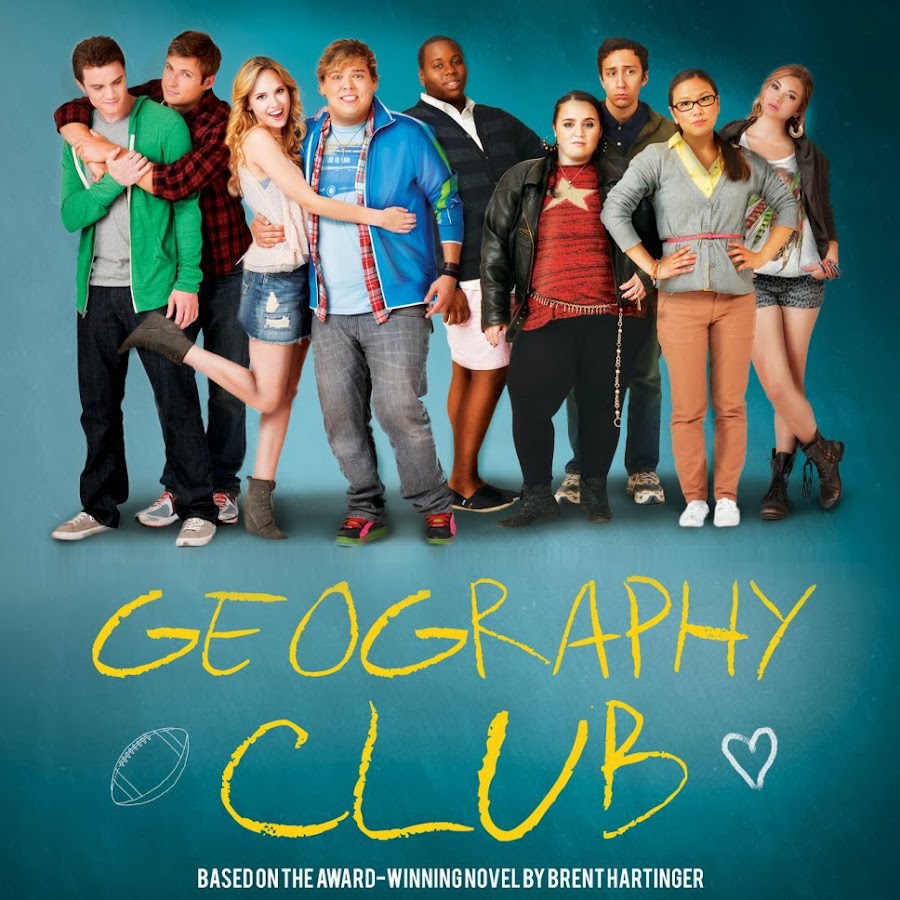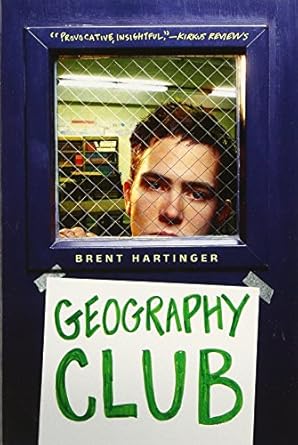Geography Club is a 2003 teen novel by Brent Hartinger, and it is the first book in The Russel Middlebrook Series. Geography Club is recommended for readers 14 years of age and older on account of its inclusion of homophobic language, profanity, bullying, discussion of sexuality, a moment of suicidal ideation, and alcohol along with tobacco use. The story follows Russel, a closeted gay teen, who is trying to come to terms with his sexuality while he also must contend with the social situations high school can present. After discovering that he is not the only gay student in his school, Russel and his friends form an LGBTQ+ support group at their high school. They call their group Geography Club under the guise of getting their club approved by their conservative school as well as to deter other students from wanting to join the group. As they establish Geography Club, Russel and his friends find unlikely allies, overcome conflicts, and expand the scope of their group to foster a better sense of connection within their school.
Since Geography Club is written for teens, the central theme of the book is about the desire and struggle to fit in with peers, which can be more difficult for LGBTQ+ individuals. This issue of fitting in is exemplified by Russel’s constant efforts to follow the gendered script for a straight teenage boy. He is always on guard with his actions and mannerisms. To be seen as straight, Russel becomes a baseball player, and he reluctantly goes on dates with his classmate, Trish. Apart from the characters wanting to be like others around them, the need for specifically queer spaces is emphasized throughout the text. It is in such spaces that LGBTQ+ people are able to learn, socialize, and be their authentic selves without fear for their personal safety. Overall, the depiction of the high school experience in Geography Club is relatable in its humor and storylines to the point that individuals from many different backgrounds can identify with the characters and their situations. With this in mind, it is great to see a book from the early 2000s with a diverse group of Black, Asian, and Polish characters.

10 years after Geography Club was published, the novel was adapted as a movie. This film is rated PG-13 for language, drinking, and sexual situations. Geography Club has a runtime of 83 minutes, and the film is currently streaming on Tubi, Peacock, PLEX, and on Amazon Prime Video. Even though the essence of the story remains the same as in Russel having to deal with his sexuality as he navigates high school, there are several differences between the book and the film. To begin with, Russel is portrayed as more intellectual and bookish in the movie than in the book. Russel’s knowledge leads the film version of Kevin to ask for Russel’s help on a fossil assignment during a field trip, which ultimately brings about their first kiss. It is at this point that Russel’s friend, Min, finds out that Russel is gay. She then takes it upon herself to start Geography Club. In the book, however, Russel, Min, and their friends are all instrumental in the founding of Geography Club. Besides these distinctions, Russel is a football player instead of a baseball player after some assistance from Kevin to get him on the team. The film includes Russel and Kevin’s conflictions over their sexualities as well as their hesitation to label themselves as gay. In the book, Russel willingly refers to himself as gay early on in the story. Russel’s questioning of his sexuality will resonate with viewers who either have been in that stage of their lives or are currently contemplating coming out.
As a film, Geography Club does not have the same heart in it as the book. This divergence can be attributed to the actors in their twenties playing high school students, a lack of genuine emotion from some of the cast, and the humor not being overly funny. Admittedly, LGBTQ+ viewers can relate to many of the events that Russel and his friends find themselves in, especially as it relates to finding a place where queer people can not only belong but thrive.
Media can be a form of community interaction in the way that individuals can remain informed as to what is happening within their community. If are questioning your identity, would like to discuss coming out, or need local LGBTQ+ resources, please contact the National LGBT Help Center through the support services listed below.
Lesbian, Gay, Bisexual, and Transgender (LGBT) National Hotline: 1-888-843-4564
LGBT National Coming Out Support Hotline: 1-888-688-5428 (1-888-OUT-LGBT)
LGBT National Youth Talkline: 1-800-246-7743 (1-800-246-PRIDE)
LGBT National Senior Hotline: 1-888-234-7243
You can also reach out online at www.LGBThotline.org/chat

